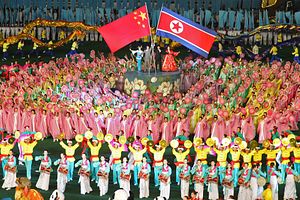Given the current political chills between Beijing and Pyongyang, the so-called “normal” state-to-state relationship between China and North Korea has obviously remained rather abnormal in reality. But what kind of relationship would be viewed as “normal” between these two neighbors?
The analysis in the international community tends to follow this general outline: China shares (or at least used to count on) a historical friendship sealed with blood with North Korea. Meanwhile, the assumption is that China in fact holds a much greater influence over North Korea than the international community can observe from the outside, but China does not want to fully utilize its influence for a number of reasons. First, a deep mistrust exists between China and North Korea due to differences in their perceptions of their respective national interests and also maybe ideological divergences. Second, despite the mistrust, China and North Korea need each other for geopolitical reasons. Third, as result, China and North Korea relations have often failed to live up to expectations, even while ties remain sufficiently “unbreakable.”
But if the current relationship is “abnormal,” the prospects for fixing it aren’t very appealing. If China and North Korea rebuild their previous close relationship, which is of course at least a possibility, that type of China-North Korea relationship could bring a type of “normality” in this region — but which all parties (probably except for North Korea) would not want to see. What if China completely breaks with North Korea and starts to fully practice its supposedly mighty influence over Pyongyang? Some states may believe that such a policy is a sign of “normality” and compliment China for acting as a genuinely responsible great power. But unfortunately, in that scenario the situation in Northeast Asia might become more unstable and particularly uncontrollable for China, and China’s maneuverability and its sway in the regional power game would be limited. Thus, to break with North Korea would actually be an “abnormal” choice for China.
Signs have shown that China’s strategy toward the two sides of the Korean Peninsula actually can be described as “moving close to South Korea but not abandoning North Korea (in Chinese, 亲韩而不弃朝).” But the current state-to-state relations between China and North Korea have been inevitably shaken by changes in the regional situation and power structure, which may be very devastating to North Korea. Therefore, China seems to be paying more attention to their unique inter-party relations to maintain, navigate, and even to further develop the special relationship between China and North Korea.
So, at the state-to-state level, China claims the relationship is a “normal” one, at the same time China has been working hard to maintain inter-party relations and insure the unique role of this party-to-party contact in dealing with North Korea issues. And in fact, the International Department of the Communist Party of China (IDCPC, 中共中央对外联络部) has a very important and uniquely influential role among all the bodies involved in China’s North Korea policy. The upcoming official visit to North Korea by Liu Yunshan, a member of the Standing Committee of the Political Bureau of the CPC, was announced in a press conference held by the IDCPC in Beijing on October 4. The spokesman said that the CPC delegation led by Liu was invited by the Central Committee of the Workers’ Party of Korea to attend the celebratory events for the 70th anniversary of the founding of Workers’ Party of Korea.
Although there have been chills between Beijing and Pyongyang and North Korean leader Kim Jong-un has not visited Beijing so far, there still have been a number of heavyweight visits to North Korea by Chinese top party leaders in the past five years: In July 2011, then-Vice Premier Zhang Dejiang, recognized for “knowing North Korea,” visited to celebrate the 50th anniversary of the conclusion of the “Treaty of Friendship, Cooperation and Mutual Assistance between the People’s Republic of China and the Democratic People’s Republic of Korea.” Zhang was a member of the Political Bureau of the CPC at the time and is currently a member of the Standing Committee of the Political Bureau of the CPC. Three months later, Standing Committee member and then-Vice Premier Li Keqiang visited North Korea on the invitation of the Central Committee of the Workers’ Party of Korea.
The upshot is that relations between China and North Korea can be analyzed on two layers, and one is probably more important than the other one in the current situation:
Regarding state-to-state relations, China firmly acknowledges the changes in the regional situation and as a result the changes of its self-perception in the regional power structure and security arena. Thus China has participated at least partially in the international sanctions against North Korea’s nuclear activities in order to build a more cooperative and responsible national image in the international community — not to mention addressing its real security concerns.
But at the party-to-party level, China will not abandon a special connection which has lasted for decades, however unstable it has been. Whether based on ideological empathy among some Chinese ruling elites or simple pragmatism, such inter-party contacts are especially important in the current situation.
In sum, China and North Korea’s political relations have remained chilly but functional. Besides reciprocal national interests, relations between the CPC and WPK contributes to this delicate balance, as inter-party contacts and communications may act as a stabilizer from time to time. But the question then becomes: What remains of China-North Korea political ties without inter-party contacts? How much further can this top-down, inter-party approach help to lead China and North Korea relations in the future?

































